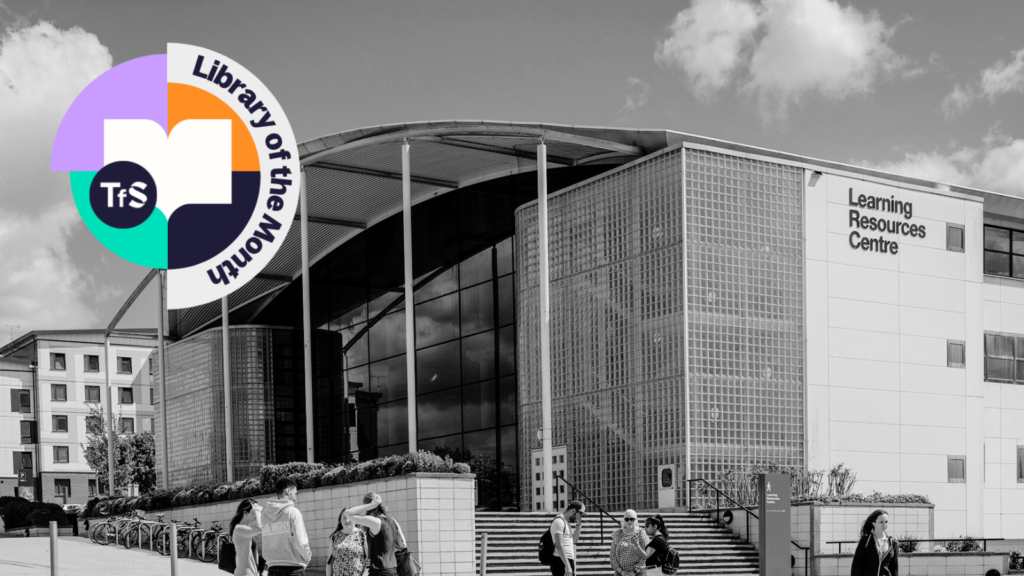Both Canada and the United States experienced an increase in the number of international students during the period of 2022 and 2023. In 2023, each country hosted approximately one million international students, with the majority originating from developing nations.
We recently hosted a webinar with information specialist, Janina Van Der Westhuizen, who has over 20 years experience within academic settings, and Eva, currently an international student at University College London (UCL). Janina and Eva were joined by our Director of Development, Jessica Clemons, to discuss how libraries can enhance support for international students by understanding their unique information needs from a global perspective.
In case you missed the webinar, you can catch up below:
Read on to discover our 7 ways that academic libraries can support the needs of international students:
Libraries can offer tailored orientation sessions for international students to introduce them to library resources, services, and staff.
Implementing mentorship programs where senior students guide newcomers can help international students navigate the library system and feel more welcomed.
“Students may find it more helpful to have personal guidance from someone who’s a student mentor and more approachable by saying it in a very conversational way. This can be conducted weekly or in the from group chats, et cetera, to make it just feel more approachable and warm, welcoming.” – Eva
Libraries can provide access to language learning tools, software, and apps which can help international students improve their language skills. Hosting conversation clubs and guided reading groups can enhance students’ confidence in speaking and understanding academic English. This can build international students’ confidence in academic communication.
“In some education systems, students may not have been encouraged to communicate or present in a second language such as English. If students haven’t had strong training in the new language of instruction, it can be hard for them to understand lectures, write papers, and join discussions, especially in subjects that with complex vocabulary expectations around academic accuracy, plagiarism and research methods can differ significantly.” – Janina
International students can feel more integrated into the university environment via organized social events, cultural celebrations, and study groups to help international students feel connected to the community. Events like library tours, book clubs, or cultural exchange sessions can create a supportive environment, and libraries can create a welcoming environment by organizing cultural exchange events to celebrate diversity and foster a sense of belonging.
Many international students may be unfamiliar with library resources in the country where they’re studying. Multilingual guides, library ambassadors, and workshops on using databases and citation tools can make library services more approachable. Offering library workshops on academic skills such as research methods, citation management, and avoiding plagiarism can help international students succeed academically.
“As a librarian myself, it’s easy to try to train students or educate students to be little librarians. A colleague of mine loves to use that phrase, but I think we all know that that’s, that’s not the case. They’re not little librarians. They have their own experiences; they have their own needs and there’s a lot of work that librarians can do to connect along those dots.” – Jessica
Designing library spaces that cater to different study needs, such as quiet areas, group study rooms, and individual study pods, can enhance the study experience.
Ensuring the library is a welcoming space with comfortable seating, good lighting, and a calm atmosphere can help students focus and feel at ease.
“I think on top of that is if the library itself has its dedicated area for like group work or individual study parts. Instead of a quiet conventional setting of the library where you just have rows of tables and chairs, you can also have separate certain areas into different functional uses. Maybe a more cross-functional area of the library would welcome students to come in more often.” – Eva
Libraries can assist students facing financial barriers by providing access to essential academic resources like textbooks and study materials.
Offering part-time job opportunities within the library can help international students manage their finances while gaining valuable work experience.
“For international students issues such as high tuition fees, hardship, currency fluctuations, and limited access to financial aid add to their financial worries. And this risk can make it difficult for them to focus their studies and it also impacts on their mental health.” – Janina
Utilizing online platforms and virtual libraries to provide resources and support to students who may be studying remotely or in hybrid learning environments. Digital tools, such as Lean Library, streamline access to library-subscribed resources and Open Access papers, boosting patrons’ productivity and saving them money.
“I’ve been using Lean Library for like half a year and it’s really helping me to find accessible readings, papers or reports which I can just press download … I think it helps me to save a lot of time.” – Eva
Collaborating with faculty to integrate library resources into online courses and learning management systems can ensure students have easy access to necessary materials.
Our discussion highlighted how essential it is for academic librarians to understand how to support the needs of international students and understand the diverse groups within academic environments. We hope our webinar has been useful in understanding a few of the ways academic libraries can support their international students.
“Turning our focus back to international students. Every path is new. Getting to know your new environment takes time and effort. Many students face significant challenges when they arrive, often related to everyday tasks that we might take for granted. Simple things like figuring out the local transport system.” – Janina
If you’d like to find out more about how Lean Library can help your institution better support international students. Request a demo now!
Congratulations to our November Library of the Month, University of Hertfordshire! November 12, 2024Each month we select a Library of the Month to honour libraries who have been using our library technologies in interesting and innovative ways, from creating well-curated reading lists with Talis Aspire to encouraging uptake of the Lean Library browser extension amongst their students. We’re also appreciating the intensive work of librarians in curating these technologies and improving learning outcomes for their students.
The winning library will be awarded a prize to share amongst their team or a donation to a charity of their choice as a way for us to say thank you.
The University of Hertfordshire is an innovative, vocation-first university situated in Hatfield, Hertfordshire. They began as a leading educator within Britain’s aeronautical industry and now have a thriving community of more than 36,000 students from over 140 countries, and students have access to more than 550 career-focused degrees.
We’ve awarded them our Library of the Month Award for November, as since rolling out Lean Library to students in September, they’ve had fantastic uptake from students, and their usage of features such as Access, Alternatives, and Assist messages has been outstanding. This means that their patrons have had streamlined access to library-subscribed resources and has boosted discovery and usage of library collections.

We asked Rebecca Scott, Project Manager at the University of Hertfordshire to tell us more about the university library and what winning Library of the Month meant to them:
“At the University of Hertfordshire, we have two vibrant and welcoming Learning Resource Centres, which are the beating heart of our urban campus. Our academic and research collections are digital-first and complemented by a growing collection of fiction and well-being print titles to cosy up with in our Reading for Pleasure area. Our LRCs feature cafes, group study areas, high-tech suites, silent study and quiet reflection areas meaning there is something for everyone.
This semester we’ve been excited to introduce our students and staff to Lean Library. We’re delighted to be awarded Library of the Month in recognition of our successful roll out of this browser extension. We want our students to find our collections wherever they choose to search and Lean Library is helping make that possible!” – Rebecca Scott, the University of Hertfordshire.

Discover our previous winners below:
Could your library be next?
Join us next month to see who’s won.
Talis Aspire Case Study: University of North Texas Health Science Center November 1, 2024
In 2019, the University of North Texas Health Science Center (UNTHSC) began reviewing its reading list and course reserves usage, discovering that the research and education library team was embedding resource links directly into Canvas and course reserves were primarily serving as textbook shelving locations. With limited usage across the institution, it highlighted a clear need to update and optimize its resource list and course reserves process.
By 2020, the urgency for an update grew as the Covid-19 pandemic limited access to print resources. In response, UNTHSC switched its library service platform to OCLC’s WMS and implemented its embedded course reserves module. Despite this change, adoption remained slow, with only three active reading lists by 2021, limited usage by students and ongoing copyright infringement issues. In 2022, the team began exploring alternative solutions and discovered that OCLC had partnered with Technology from Sage to offer Talis Aspire to WMS customers as a comprehensive resource list management and course reserves solution. Due to its integration with existing systems, copyright capabilities and course reserves functionality, it proved to be the solution that best fit their needs.
By June 2022, UNTHSC had adopted Talis Aspire as their resource list management and course reserves system, which it branded internally as “List It.” The library team understood that full institutional support was essential for a successful implementation, so by 2023 they collaborated with various teams across UNTHSC to make the launch of Talis Aspire a success.
They worked closely with instructional designers, providing training on Talis Aspire, emphasizing its importance, showcasing its capabilities for managing copyright and course reserves and stressing the importance of providing students immediate access to resources at the start of each course.
Adoption across the institution
By 2024, UNTHSC successfully launched Talis Aspire with a 1,333% increase in inactive reading list creation, rising from 3 to 43 lists. Of these, 38 course reading lists were created to ensure that students had access to all class resources from day one and are aware of which items are available as course reserves to avoid unnecessary purchases. Additionally, 5 reading lists now support campus initiatives, including a reading list for training programs across the institution.
Student savings and better insights into savings
Improved analytics was another welcomed benefit of Talis Aspire. The library team can now estimate savings by calculating the cost of each item students used in the course list. For one class alone, annual student savings exceeded $125,000.
Streamlined communication and copyright compliance
Talis Aspire also improved campus-wide communication, helping faculty and students understand reading lists, course reserves, content contracts, and copyright regulations, with copyright compliance now being nearly perfect across all courses.
The introduction of Talis Aspire has profoundly impacted academic workflows, strengthened interdepartmental collaboration, and improved support between departments, making collaboration an ongoing integrated process rather than a sporadic process. Faculty and staff are now better equipped to utilize course reading lists and course reserves effectively, with the library working closely with students to identify resource needs, leading to more informed collection development and ensuring resource availability when needed by students.
Talis Aspire has also had a measurable impact on student savings by reducing the need for students to purchase course materials individually. With clear access to essential resources through reading lists and course reserves, students can avoid unnecessary purchases, while the library can better track and estimate savings across courses.
Find out more about Talis Aspire.
If you’d like to hear more or receive a product demo, get in touch.